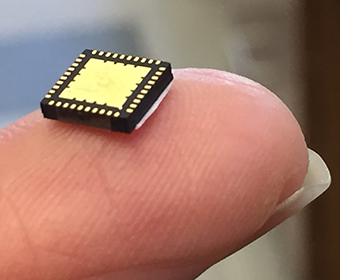New chip under development at UTSA extends battery life of electronics

The chip makes batteries smaller and low power electronics work more efficiently.
(May 1, 2017) -- Ruyan Guo, Robert E. Clarke Endowed Professor of Electrical and Computer Engineering at The University of Texas at San Antonio (UTSA), has received a $50,000 I-Corps grant from the National Science Foundation to commercialize a chip that can make lower power electronics, like cell phones, work more efficiently.
Guo's team developed the technology, which is about the size of a pin's head, with UTSA researcher Shuza Binzaid in the UTSA Multifunctional Electronic Materials and Devices Research Laboratory alongside graduate student Avadhood Herlekar.
"The purpose of this grant is to better identify the commercial opportunities for technology created at universities," Guo said.
Guo and Binzaid are currently working with marketplace experts, as well as UTSA technology and IP management specialist Neal A. Guentzel, to understand the needs of consumers so they can determine which industry their chip is best suited for. It's an odd problem to have, since the device is applicable to several different uses, from every day electronics to medical apparatuses.
"This chip can be used with anything that runs on a battery," said Binzaid. "It manages power so that the device can last longer."
Cell phone users in desperate need of a charge, for example, put their devices on low power mode and reduce its regular functions to extend the battery life of their phones. The chip can keep a phone working at top functionality with much less power. Moreover, it facilitates the use of smaller batteries, since the object itself is so small.
The chip also tackles another common annoyance for electronics users: how hot devices get when they're being used for several minutes.
"The heat is a result of a lot of power being used," Guo said. "It's a nuisance, but with our device there is less power consumption, which means the heat will be much less of an issue."
Guo noted that as the "internet of things" becomes more integrated into the average person's daily life, battery power will continue to become a valuable resource. Beyond lower power devices such as cell phones, the chip could be used in fire sensors, fitness monitors and even medical apparatuses.
"We hope to make a significant leap forward in defibrillators and pacemakers," she said. "Invasive surgeries to replace medical devices that are running out of power could become much less frequent."
For now, Guo's team is focusing on developing the chip for customized sensors, with more possibilities on the horizon.
UTSA is ranked among the top 400 universities in the world and among the top 100 in the nation, according to Times Higher Education.
-------------------------------
Learn more about the UTSA Department of Electrical and Computer Engineering.
Connect with UTSA online at Facebook, Twitter, YouTube, Instagram and LinkedIn.
Events
Move In To COLFA is strongly recommended for new students in COLFA. It gives you the chance to learn about the Student Success Center, campus resources and meet new friends!
Academic Classroom: Lecture Hall (MH 2.01.10,) McKinney Humanities BldgWe invite you to join us for Birds Up! Downtown, an exciting welcome back event designed to connect students with the different departments at the Downtown Campus. Students will have the opportunity to learn about some of the departments on campus, gain access to different resources, and collect some giveaways!
Bill Miller PlazaCome and celebrate this year's homecoming at the Downtown Campus with food, games, giveaways, music, and more. We look forward to seeing your Roadrunner Spirit!
Bill Miller Plaza

